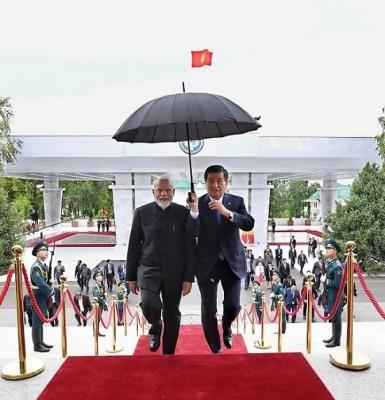(MENAFN- IANS)

By Ateet Sharma
New Delhi, Jan 4: India's growing partnership with the Central Asian countries and the unbroken camaraderie with Russia - highly visible during Vladimir Putin's visit to New Delhi in December - could irk China a lot, feel some of Moscow's top strategic experts.
The last 12 months have seen New Delhi tightening its bond with the landlocked regions of Eurasia, especially after the turbulence in Afghanistan.
The territory is also the Kremlin's traditional foreign policy priority and forming Greater Eurasian partnership is part of Putin's initiative.
As reported by IndiaNarrative.com, a few days before his visit to the Indian capital, Putin had regarded India as one of the strong independent 'centres of a multipolar world' with a foreign policy philosophy and priorities 'that are close to us'.
The Central Asian countries followed the Russian leader by underlining the civilisational, cultural, trade and people-to-people linkages between India and their countries during the third meeting of the India-Central Asia Dialogue on December 19.
While the foreign ministers of Central Asian countries called India their strategic partner, Prime Minister Narendra Modi had emphasised that they remain India's 'extended neighbours' and all possible efforts should be made to strengthen comprehensive cooperation between the countries of Central Asia and South Asia, in which India is ready to provide the maximum assistance.
The events, not surprisingly, are enough to make Beijing uncomfortable, reckon experts.
In an interview with Russian daily Nezavisimaya Gazeta, Russian defence analyst Ruslan Pukhov, who is also the Director of the Moscow-based Centre for Analysis of Strategies and Technologies, said that the intensification of India's diplomatic efforts and its interaction with Russia in Central Asia would certainly not please Beijing.
'After all, poor countries are forced to agree to loans from China on any terms, even at the risk of being in debt. And now the PRC appears to have a competitor,' said Pukhov.
The defence expert reckoned that while the 'ambitions of India' may cause 'some inconvenience' to Russia as well, Delhi does not want to weaken Moscow's position at all.
'But the Central Asian regimes, depending on Moscow economically and militarily, now have room for manoeuvre. They can bargain with us,' he added.
However, sources tell IndiaNarrative.com that India's engagement with the region will happen keeping the Russian interests in mind.
With New Delhi and Moscow having pledged extensive military-technical cooperation until 2030, both will be working together on having a joint manufacturing of military equipment in Central Asia, which would benefit all partners.
Also, unlike China's Belt and Road Initiative (BRI), New Delhi's efforts on having an inter-connected Eurasia through the development of Chabahar port in Iran and also enhancing connectivity with the landlocked region via the International North-South Transport Corridor (INSTC), highlight India's internationalism - that of always seeing the world as a family.
While Beijing makes inroads into several Central Asian nations through BRI, members of the Commonwealth of Independent States (CIS) have become increasingly uncomfortable with the growing Chinese presence through various infrastructure projects.
India, on the other hand, has always stressed that connectivity projects to build modern arteries of commerce must adhere to the most basic principle of international relations - respect for sovereignty and territorial integrity.
'Respect for the sovereignty and territorial integrity of nations rank foremost among them. It is also important that connectivity building is a participative and consensual exercise, based on financial viability and local ownership. They must not serve other agendas,' External Affairs Minister S Jaishankar had said last October while addressing the 6th Ministerial meeting of the Conference of Interaction and Confidence Building Measures in Asia (CICA) at Kazakhstan capital Nur-Sultan.
In a fast-changing geopolitical scene, countries like Tajikistan, Kyrgyzstan, Uzbekistan, Turkmenistan and Kazakhstan have appreciated India's role in sustainable and stable development of the region.
The visit of Heads of State from these countries as special guests on the Republic Day later this month could also mark a new high at the start of 2022 - the 30th anniversary of the establishment of diplomatic relations between India and Central Asian States.
(The content is being carried under an arrangement with indianarrative.com)
--indianarrative
MENAFN04012022000231011071ID1103483646
Legal Disclaimer:
MENAFN provides the information “as is” without warranty of any kind. We do not accept any responsibility or liability for the accuracy, content, images, videos, licenses, completeness, legality, or reliability of the information contained in this article. If you have any complaints or copyright issues related to this article, kindly contact the provider above.